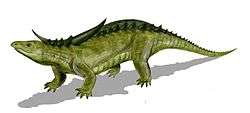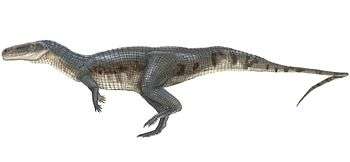Euscolosuchus
| Euscolosuchus Temporal range: Late Triassic | |
|---|---|
| Scientific classification | |
| Kingdom: | Animalia |
| Phylum: | Chordata |
| Class: | Reptilia |
| Clade: | Suchia |
| Genus: | †Euscolosuchus Sues, 1992 |
| Type species | |
| †''Euscolosuchus olseni Sues, 1992 | |
Euscolosuchus is an extinct genus of suchian closely related to crocodylomorphs. Fossils have been found from the Tomahawk Creek Member of the Turkey Branch Formation (part of the Newark Supergroup) outcropping in east-central Virginia. The locality from which the material was found dates back to the early Carnian stage of the Late Triassic, based on palynological studies. These strata are known for the abundance of fossil material belonging to tetrapod vertebrates in relation to other sites of the Newark Supergroup in the Richmond Basin that generally lack such material. The site is unique among others in the supergroup and closely resembles localities in the southern hemisphere, as is suggested by the presence of numerous fossils of traversodont cynodonts found from the area. Other tetrapods present include procolophonians,[1] chiniquodontids, and sphenodonts.[2]
The name Euscolosuchus, meaning "well pointed crocodile" in Greek, refers to the prominent lateral spikes projecting from the posterior cervical and dorsal osteoderms that are characteristic of the genus. These osteoderms imbricate (overlap) paramedially down the back and form a narrow dorsal carapace similar to the desmatosuchine stagonolepidids. A spinal table formed by broadened neural arches help support these osteoderms on the back. The scutes interlock with one another through a series of grooves and projections, with each plate overlapping the one posterior to it and having an anterolateral articulatory process project anteriorly from it and lie over the plate in front of it. These osteoderms, as well as the fragmentary vertebrae, are all that are known from the genus and thus the only material from which the genus can be classified.[3]
Euscolosuchus appears to be a very close relative of the crocodylomorphs, a clade of pseudosuchians that includes all living crocodilians. Other pseudosuchians thought to be closely related to crocodylomorphs include Gracilisuchus and possibly Erpetosuchus. The later has been proposed to be the sister taxon of the crocodylomorphs, although this position has been questioned[4][5]
References
- ↑ Sues, H.-D.; Olsen, P. E. (1993). "A new procolophonid and a new tetrapod of uncertain, possibly procolophonian affinities from the Upper Triassic of Virginia". Journal of Vertebrate Paleontology. 13 (3): 282–286. doi:10.1080/02724634.1993.10011510.
- ↑ Sues, H.-D.; Olsen, P. E. (1990). "Triassic vertebrates of Gondwanan aspect from the Richmond Basin of Virginia". Science. 249 (4972): 1020–1023. doi:10.1126/science.249.4972.1020. PMID 17789610.
- ↑ Sues, H.-D. (1992). "A Remarkable New Armored Archosaur from the Upper Triassic of Virginia". Journal of Vertebrate Paleontology. 12 (2): 142–149. doi:10.1080/02724634.1992.10011444.
- ↑ Olsen, P. E.; Sues, H.-D.; Norell, M. A. (2000). "First record of Erpetosuchus (Reptilia: Archosauria) from the Late Triassic of North America". Journal of Vertebrate Paleontology. 20 (4): 633–636. doi:10.1671/0272-4634(2000)020[0633:FROERA]2.0.CO;2.
- ↑ Nesbitt, S. J.; Butler, R. J. (2012). "Redescription of the archosaur Parringtonia gracilis from the Middle Triassic Manda beds of Tanzania, and the antiquity of Erpetosuchidae". Geological Magazine: 1. doi:10.1017/S0016756812000362.




